A Day for Songs and Contests
The Odyssey Book 8
Exploring Life through the Written Word
"So the famous singer sang his tale, but Odysseus melted, and from under his eyes the tears ran down, drenching his cheeks. As a woman weeps, her arms flung around her darling husband, a man who fell in battle, fighting for town and townsmen, trying to beat the day of doom from home and children. Seeing the man she loved in death throes, gasping for breath, she clings for dear life, screams and shrills—"
Dear friends,
Book 8 of Homer's The Odyssey portrays a key moment in Odysseus's journey, serving as both a respite from his trials and a profound exploration of heroism, identity, and the power of storytelling. The book opens with Odysseus as a guest among the Phaeacians on the island of Scheria, still concealing his true identity from his hosts. King Alcinous has called an assembly to discuss the mysterious stranger who washed up on their shores, and the day unfolds with a series of events that will ultimately lead to one of the epic's most emotionally charged moments.
The morning begins with Alcinous summoning the Phaeacian lords to the palace, where they gather to hear more about their enigmatic guest. The king announces his intention to provide Odysseus with safe passage home, demonstrating the Phaeacians' legendary hospitality and their divine favor with Poseidon, who typically grants them swift and safe voyages. This announcement sets in motion a day of celebration and competition that will test not only physical prowess but also the very nature of heroic identity.
Following the assembly, Alcinous leads the gathering to the dancing ground, where the blind bard Demodocus takes center stage. The bard's first song tells of the quarrel between Odysseus and Achilles at Troy, a tale that immediately strikes at the heart of the disguised hero's identity. As Demodocus sings of the argument between the two greatest Greek heroes—one representing cunning and endurance, the other embodying martial valor and glory—Odysseus pulls his cloak over his head and weeps. This emotional response goes unnoticed by most, but Alcinous observes his guest's distress with growing concern.
The king, demonstrating both tact and wisdom, calls for an end to the song and proposes athletic competitions to entertain their guest. The Phaeacians, renowned for their skill in seafaring, dancing, and sports, organize contests in running, wrestling, jumping, and discus throwing. The young Phaeacian nobles display their abilities while Odysseus watches from the sidelines, still maintaining his role as a passive observer rather than revealing his true nature as one of the greatest heroes of his age.
The dynamics shift dramatically when Broadsea, a young Phaeacian athlete, challenges Odysseus to participate in the games. Initially, Broadsea's invitation appears friendly, but it quickly becomes clear that his words carry an undertone of mockery and presumption. He suggests that Odysseus looks more like a merchant concerned with profit than a true athlete, questioning whether the stranger has ever engaged in the kinds of contests that define aristocratic excellence. This insult strikes at the core of heroic identity in the ancient world, where physical prowess and competitive spirit were essential markers of noble birth and character.
Odysseus's response marks the first crack in his carefully maintained disguise. Stung by the slight to his honor, he rises from his seat and, without even removing his cloak, grasps a massive discus—larger than any the Phaeacians had been using—and hurls it far beyond all previous marks. The throw is so powerful and precise that it astonishes the onlookers and immediately establishes Odysseus as an athlete of extraordinary ability. This moment serves as more than mere physical demonstration; it represents the irrepressible nature of true heroic identity, which cannot remain hidden when honor is at stake.
Following his impressive display, Odysseus delivers a sharp rebuke to Broadsea, revealing both his wounded pride and his formidable rhetorical skills. He challenges any Phaeacian to match him in boxing, wrestling, or archery, making an exception only for his host, Laodamas, out of respect for hospitality customs. His words carry the authority of someone accustomed to command and combat, hinting at depths of experience that contradict his earlier passive demeanor. The speech also reveals his intimate knowledge of warfare and competition, as he claims expertise in handling the bow—a skill that will prove crucial in his eventual reclaiming of his kingdom.
Recognizing the tension his guest's words have created, and perhaps sensing the true magnitude of the man before him, Alcinous intervenes diplomatically. He acknowledges Odysseus's obvious skill while steering the conversation toward the Phaeacians' particular talents. Rather than continuing with potentially contentious athletic competitions, the king calls for a demonstration of Phaeacian excellence in dance and music, areas where his people excel and which can provide entertainment without further challenging their guest's honor.
The celebration continues with an elaborate dance performed by the king's sons, Halius and Laodamas, whose skill in handling a purple ball demonstrates the refined artistry for which the Phaeacians are renowned. Their performance represents a different kind of excellence from the martial prowess Odysseus has displayed—one that emphasizes grace, coordination, and aesthetic beauty rather than raw power and competitive dominance. This contrast highlights the broader theme of different forms of excellence and the various ways societies can achieve greatness.
As the dance concludes, Alcinous makes a generous gesture that further demonstrates Phaeacian hospitality and serves to restore harmony after the earlier tension. He calls upon his nobles to present gifts to their guest, and even Broadsea, the young man whose careless words precipitated the conflict, offers both a valuable sword and a formal apology. This resolution showcases the civilizing power of proper hospitality customs and the importance of honor and reconciliation in maintaining social harmony.
The day's events culminate with a second performance by Demodocus, this time at Odysseus's specific request. The hero asks the bard to sing of the Trojan Horse, the stratagem that Odysseus himself devised and that ultimately led to Troy's fall. As Demodocus tells this tale—describing how Odysseus and his companions hid within the wooden horse, how the Trojans debated its significance, and how the Greeks emerged to sack the city—Odysseus once again weeps, but this time his emotional response is even more intense and sustained.
The bard's song provides a detailed account of that final night in Troy, when Odysseus's cunning strategy brought the ten-year war to its decisive conclusion. Demodocus describes the horse being brought into the city, the celebration of the unsuspecting Trojans, and the moment when Odysseus and his select band of warriors emerged to open the gates for the Greek army. The song captures both the triumph of Greek victory and the terrible destruction that followed, as Troy burned and its people were killed or enslaved.
As the tale unfolds, Odysseus's grief becomes impossible to conceal. Homer compares his weeping to that of a woman whose husband has been killed defending their city, who is then dragged away to slavery while her world collapses around her. This powerful simile transforms Odysseus from victor to victim, emphasizing the human cost of war even for those who emerge triumphant. The comparison suggests that Odysseus's tears flow not only from personal memory but from a deep understanding of suffering—both his own and that which he has caused others.
Alcinous, who has been observing his guest throughout the performance, finally intervenes. The king's perception and diplomatic skill become evident as he calls for an end to the song and directly addresses the source of his guest's obvious distress. He notes that ever since the bard began singing of Troy, the stranger has been overcome with grief, and he gently but firmly requests that his guest reveal his true identity. Alcinous's approach demonstrates both respect for his guest's privacy and recognition that the current situation has become untenable.
The king's words set the stage for what will become one of the epic's most significant moments of revelation. He asks not only for his guest's name and homeland but also for the story of his wanderings—the very narrative that will constitute the next four books of the epic. Alcinous frames his request in terms of the reciprocal nature of hospitality: they have provided entertainment and gifts, and now their guest should provide the story that will complete the exchange.
Book 8 thus serves as a carefully constructed bridge between Odysseus's arrival among the Phaeacians and his great revelation of identity that will follow. The book explores themes of heroic identity, the relationship between different forms of excellence, the civilizing power of hospitality, and the complex emotional legacy of war and victory. Through its intricate structure of songs, games, and social interactions, it demonstrates Homer's sophisticated understanding of how identity is both concealed and revealed through social performance.
Literary Analysis
Book 8 of The Odyssey is a masterpiece of narrative construction, functioning as both an independent episode and a crucial structural element within the larger epic. Homer employs a sophisticated pattern of concealment and gradual revelation that mirrors the broader themes of the entire work. The book operates on multiple levels simultaneously: as a realistic depiction of aristocratic hospitality, as a meditation on the nature of heroism, and as a psychological exploration of trauma and identity.
The literary technique of dramatic irony pervades the entire book, creating layers of meaning that enrich each scene. While the Phaeacians see only a mysterious stranger, the audience understands that they are witnessing one of the greatest heroes of the Trojan War attempting to navigate social situations while concealing his true nature. This irony becomes particularly poignant during Demodocus's songs, when the bard unknowingly performs the very deeds of his anonymous audience member. The effect creates a profound sense of isolation around Odysseus, emphasizing how completely he has been cut off from his former life and identity.
Homer's use of embedded narratives through Demodocus's songs serves multiple functions within the work's architecture. The songs provide exposition about events that preceded the main narrative, establish Odysseus's heroic credentials for the audience, and create emotional climaxes that drive the plot forward. More subtly, they demonstrate the power of poetic narrative itself—a self-reflexive element that highlights Homer's own role as a bard preserving and transmitting heroic memory. When Demodocus sings of the quarrel between Odysseus and Achilles, he touches on the fundamental tension between different heroic ideals that runs throughout Greek literature: the choice between cunning survival and glorious death.
The athletic contests serve as more than mere entertainment; they function as a microcosm of the competitive aristocratic culture that defined ancient Greek society. Odysseus's initial reluctance to participate and his eventual explosive demonstration of skill create a narrative pattern that reflects his larger journey. Just as he must eventually reclaim his throne through a display of superior force, here he must assert his true nature when his honor is challenged. The discus throw becomes a symbolic moment of revelation, suggesting that authentic heroic nature cannot be permanently suppressed.
The character of Broadsea serves as more than a simple antagonist; he represents the dangers of superficial judgment and the younger generation's incomplete understanding of heroic virtue. His initial slight to Odysseus reveals both the insularity of Phaeacian society and the ways in which true worth can be overlooked when it doesn't conform to expected appearances. His subsequent apology and gift-giving demonstrate the possibility of growth and the importance of reconciliation in maintaining social harmony.
Homer's psychological insight becomes particularly evident in his treatment of Odysseus's emotional responses to the songs. The hero's tears represent more than simple nostalgia; they indicate a complex mixture of pride, grief, and trauma that suggests the psychological costs of heroic achievement. The simile comparing his weeping to that of a woman whose city has been sacked transforms him from conqueror to victim, highlighting the universal nature of suffering and the moral complexity of even justified warfare.
The structure of the book, moving from public assembly to private emotion, from physical competition to artistic performance, creates a rhythm that builds inexorably toward revelation. Each scene adds pressure to Odysseus's disguise while simultaneously deepening the reader's understanding of both his character and the society that hosts him. The progression from passive observation through reluctant participation to active emotional engagement mirrors the larger arc of his journey from wanderer to homecoming hero.
Historical Context: Aristocratic Culture and Social Values
Book 8 provides a remarkably detailed window into the social structures and values of ancient Greek aristocratic society, offering insights that extend far beyond the specific narrative of Odysseus's adventures. The Phaeacian court represents an idealized version of the kind of palatial culture that characterized the late Bronze Age, the historical period that forms the backdrop for the Trojan War stories, while also reflecting the social realities of Homer's own time in the Archaic period.
The institution of xenia, or ritualized hospitality, dominates the social interactions throughout the book and represents one of the fundamental organizing principles of ancient Mediterranean societies. King Alcinous's treatment of Odysseus follows the established patterns of aristocratic guest-friendship that created networks of mutual obligation across the Greek world. The king's immediate offer of safe passage, the assembly called in the guest's honor, and the lavish entertainment provided all demonstrate the sacred nature of hospitality obligations. These customs served practical functions in a world where travel was dangerous and formal diplomatic relations were limited, but they also expressed deeper values about human dignity and divine favor.
The athletic competitions depicted in the book reflect the central role of physical excellence in defining aristocratic identity. The Greek concept of arete—often translated as virtue or excellence—encompassed both moral and physical qualities, and prowess in athletics served as both training for warfare and demonstration of inherent nobility. The specific contests mentioned—running, wrestling, jumping, and discus throwing—were precisely the events that would later be formalized in the Olympic Games and other Panhellenic festivals. Odysseus's superior performance establishes his credentials not merely as a skilled athlete but as a member of the heroic class whose physical abilities mark him as divinely favored.
The figure of Demodocus the bard provides crucial evidence for understanding the role of oral poetry in ancient Greek society. Bards served as more than entertainers; they were the primary means by which cultural memory was preserved and transmitted. Their repertoire of traditional stories provided both historical knowledge and moral instruction, helping to maintain social cohesion by celebrating shared values and common heritage. The fact that Demodocus is blind follows a traditional association between blindness and prophetic or poetic insight, suggesting that bardic knowledge transcends ordinary perception.
The songs performed by Demodocus also illuminate the complex relationship between historical memory and poetic tradition in ancient Greece. While the Trojan War stories likely contained some historical kernel, they had been transformed through generations of oral transmission into vehicles for exploring timeless themes about honor, loss, and human nature. The quarrel between Odysseus and Achilles, for instance, probably reflects genuine tensions between different strategic approaches during the historical conflict, but it also serves as a meditation on competing heroic ideals.
The gift-exchange that concludes the athletic episode demonstrates another fundamental aspect of ancient aristocratic society. The presentation of valuable objects served multiple functions: it displayed the wealth and generosity of the giver, created bonds of reciprocal obligation, and provided a means of storing and transferring wealth in societies where monetary systems were primitive or nonexistent. Broadsea's gift of a sword to Odysseus represents more than an apology; it establishes a formal relationship that carries ongoing obligations and expectations.
The social hierarchy evident in Phaeacian society reflects broader patterns of organization that characterized early Greek communities. The king's authority appears to depend more on consensus and personal charisma than on absolute power, and the prominence given to athletic and artistic excellence suggests a culture where individual achievement was highly valued. The respectful treatment accorded to skilled craftsmen and artists indicates a society that recognized multiple forms of valuable contribution, not merely martial prowess.
Contemporary Relevance: Modern Echoes of Ancient Themes
The themes and situations explored in Book 8 of The Odyssey resonate powerfully with contemporary concerns, demonstrating the enduring relevance of Homer's insights into human nature and social dynamics. The book's exploration of identity, competition, hospitality, and the psychological impact of conflict speaks directly to modern experiences, while its examination of cultural values provides perspective on current social challenges.
The central theme of concealed identity has particular resonance in our contemporary world, where questions of authentic selfhood versus social performance have become increasingly complex. Odysseus's struggle to maintain his disguise while his true nature continually threatens to break through mirrors the experiences of many modern individuals who must navigate between public personas and private realities. Whether in professional environments, social media platforms, or immigrant communities, people today face similar challenges in managing multiple aspects of their identity while seeking authentic connection and recognition.
The athletic competitions and the values they represent find clear parallels in contemporary sports culture and the ongoing debate about the role of competition in society. Odysseus's initial reluctance to participate, followed by his spectacular demonstration of skill when challenged, reflects modern discussions about performance pressure, the costs of excellence, and the relationship between individual achievement and community belonging. The incident also highlights how easily misunderstandings can arise when people make assumptions based on appearances, a phenomenon particularly relevant in our increasingly diverse and interconnected world.
The concept of hospitality explored through Phaeacian customs speaks directly to contemporary debates about immigration, refugee assistance, and cultural integration. King Alcinous's generous treatment of a mysterious stranger, despite not knowing his background or intentions, provides a model for approaching cultural others with openness and respect. The reciprocal nature of the host-guest relationship, where both parties have obligations and expectations, offers insights relevant to modern discussions about multiculturalism and social integration.
Demodocus's role as cultural memory keeper has fascinating parallels with contemporary concerns about historical preservation, media representation, and the power of narrative to shape collective understanding. In an era of rapid information flow and competing narratives, the bard's function as a trusted source of shared cultural knowledge raises important questions about who gets to tell authoritative stories and how societies maintain coherent identities across time. The emotional impact of his songs on Odysseus also demonstrates how artistic representation can trigger profound personal responses, much like how historical documentaries, war films, or literary works can affect audiences who have lived through similar experiences.
The psychological dimension of Odysseus's responses to the war songs speaks directly to contemporary understanding of trauma and its long-term effects. His intense emotional reactions, particularly to the account of the Trojan Horse, reflect what modern psychology recognizes as symptoms of post-traumatic stress. The fact that even triumphant memories can trigger profound grief illuminates the complex legacy of combat experience and the difficulty many veterans face in processing their military service. Homer's insight that victory and loss are often intertwined anticipates modern therapeutic approaches that recognize the moral complexity of survival and success.
The book's exploration of different forms of excellence—athletic, artistic, intellectual, and moral—resonates with contemporary discussions about multiple intelligences, diverse talents, and the need for inclusive definitions of success. The contrast between Odysseus's martial prowess and the Phaeacians' emphasis on dance and artistic performance suggests that healthy societies benefit from recognizing and celebrating various forms of human achievement.
The diplomatic skills demonstrated by King Alcinous in managing social tensions provide valuable lessons for modern leadership, particularly in diverse and potentially fractious communities. His ability to recognize mounting conflict, redirect energy toward positive activities, and create opportunities for reconciliation demonstrates timeless principles of effective governance and social management.
Finally, the book's ultimate movement toward revelation and authentic communication speaks to contemporary struggles with isolation, mental health, and the need for genuine human connection. Odysseus's gradual emergence from concealment toward honest self-disclosure mirrors therapeutic processes and personal growth journeys that remain central to human flourishing. The recognition that authentic relationships require mutual vulnerability and truth-telling provides wisdom relevant to both personal relationships and broader social harmony.
Book 8 of The Odyssey is both a masterful piece of ancient literature and a source of enduring insight into the human condition. Its sophisticated exploration of identity, community, excellence, and emotional authenticity continues to offer valuable perspectives on challenges that transcend historical periods and cultural boundaries. Through its combination of thrilling narrative, psychological depth, and social observation, it demonstrates why Homer's epic has maintained its relevance across nearly three millennia and continues to speak meaningfully to contemporary readers and societies.
The book ultimately suggests that true heroism involves not merely individual achievement but the ability to navigate complex social relationships with wisdom, integrity, and emotional honesty. In our current era of global interconnection, cultural diversity, and rapid change, these insights remain as relevant and valuable as they were in the ancient world, providing both inspiration and practical wisdom for addressing the challenges of modern life.
Study Questions
Identity and Performance: Throughout Book 8, Odysseus maintains his disguise while his true heroic nature repeatedly threatens to break through. How does Homer use the tension between concealed and revealed identity to create dramatic interest? What does this suggest about the relationship between authentic selfhood and social performance? Consider how this theme might relate to your own experiences of presenting different aspects of yourself in various social contexts.
Competing Values and Forms of Excellence: The book presents different models of achievement through Odysseus's martial prowess, the Phaeacians' emphasis on dance and artistry, and Demodocus's poetic skill. How do these different forms of excellence complement or conflict with each other? What does the text suggest about how societies should recognize and value diverse talents? How might these ancient perspectives inform contemporary discussions about success, education, and social recognition?
The Power and Burden of Memory: Demodocus's songs about the Trojan War trigger intense emotional responses in Odysseus, suggesting that even triumphant memories can carry psychological costs. How does Homer present the relationship between heroic achievement and personal suffering? What does Odysseus's reaction to hearing his own deeds celebrated reveal about the nature of fame, victory, and historical memory? How might this relate to contemporary understanding of trauma, veteran experiences, or the complexity of personal and collective memory?
Reading Assignment for Next Week
We will cover Book 9. In the Fagles translation, this chapter is titled In the One-Eyed Giant’s Cave and spans pages 211-229. In the Wilson translation, this chapter is titled A Pirate in a Shepherd’s Cave and spans pages 240-258.
Beyond the Bookshelf is a reader-supported publication. If you've found value in my work and it has helped, informed, or entertained you, I'd be grateful if you'd consider leaving a tip. Your support helps me continue creating content and means more than you know. Even small contributions make a real difference and allow me to keep sharing my work with you. Thank you for reading and for any support you're able to offer.
Affiliate links: You can click on the title of any book mentioned in this article to purchase your own copy. These are affiliate links, earning me a very small commission for any purchase you make.
Until next time,
Previous articles in this series:
If you are a new subscriber or missed any of the previous articles in this series, you can catch up at the link below:
All opinions in this essay are my own unless otherwise noted. Additionally, I have highlighted all sources in the text if needed.



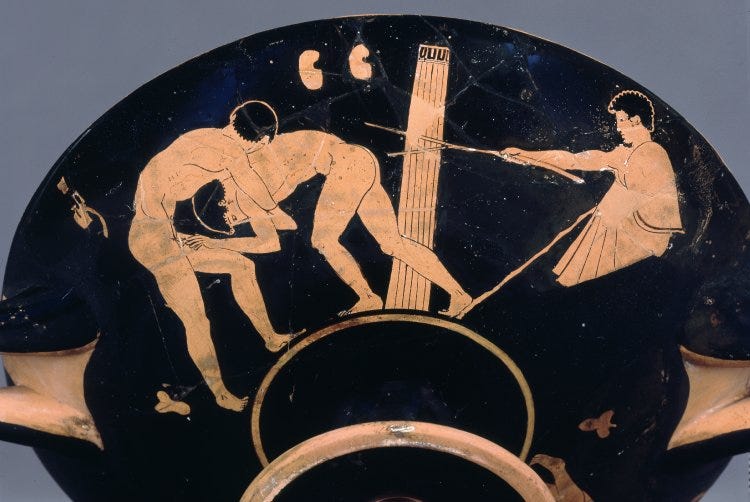
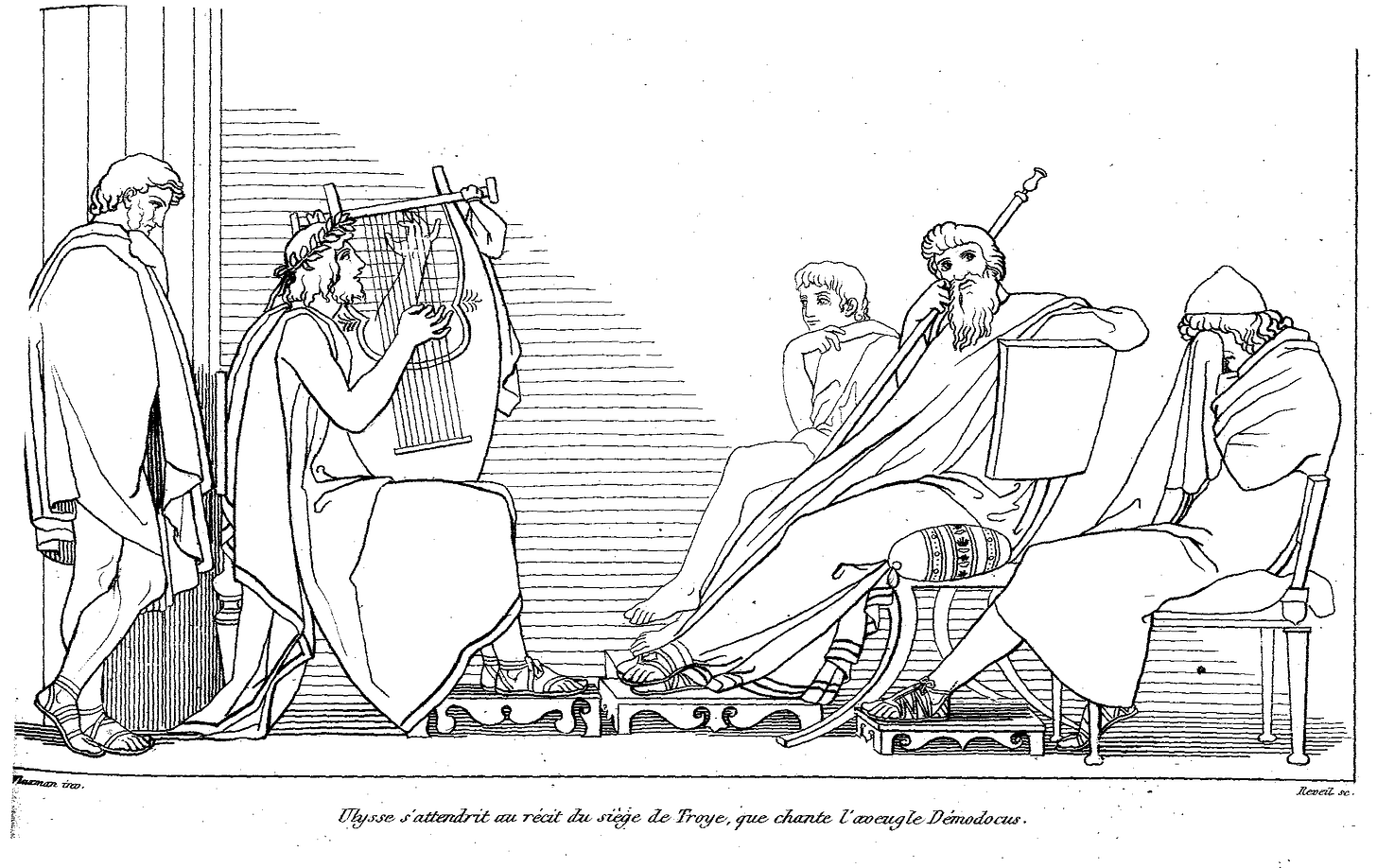

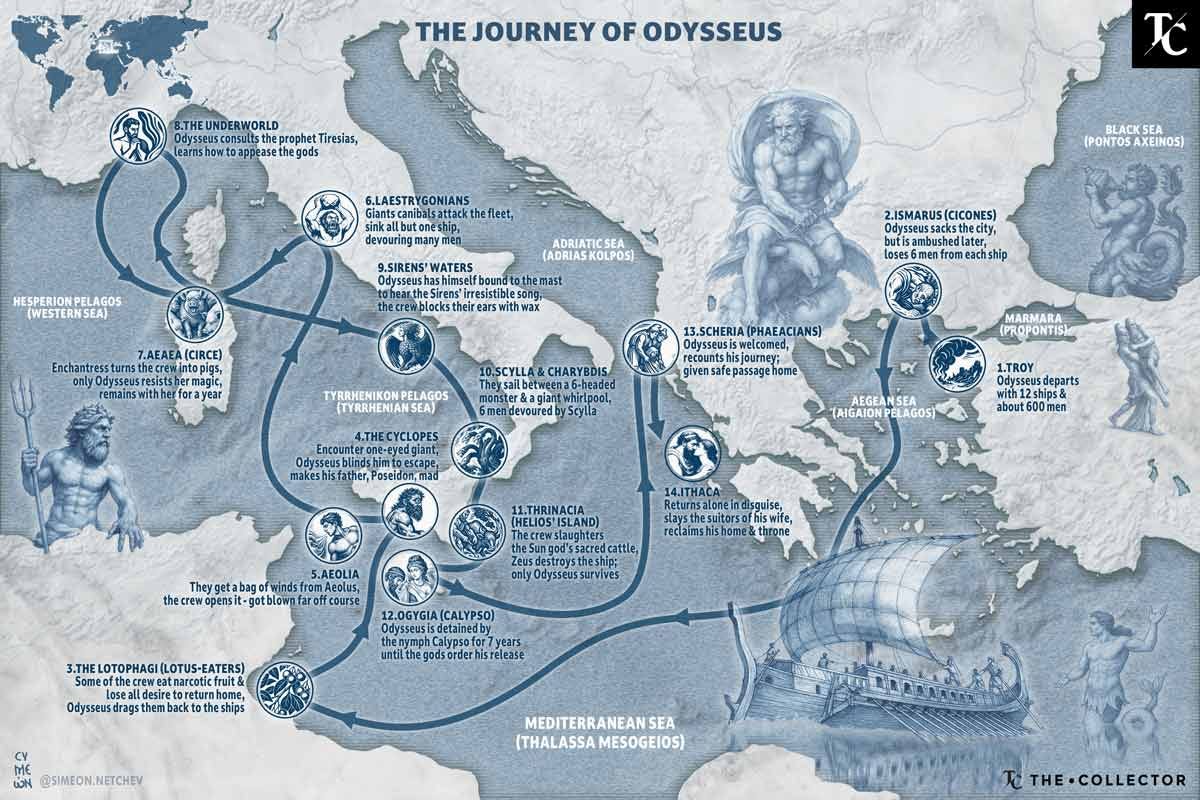


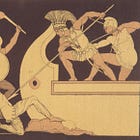
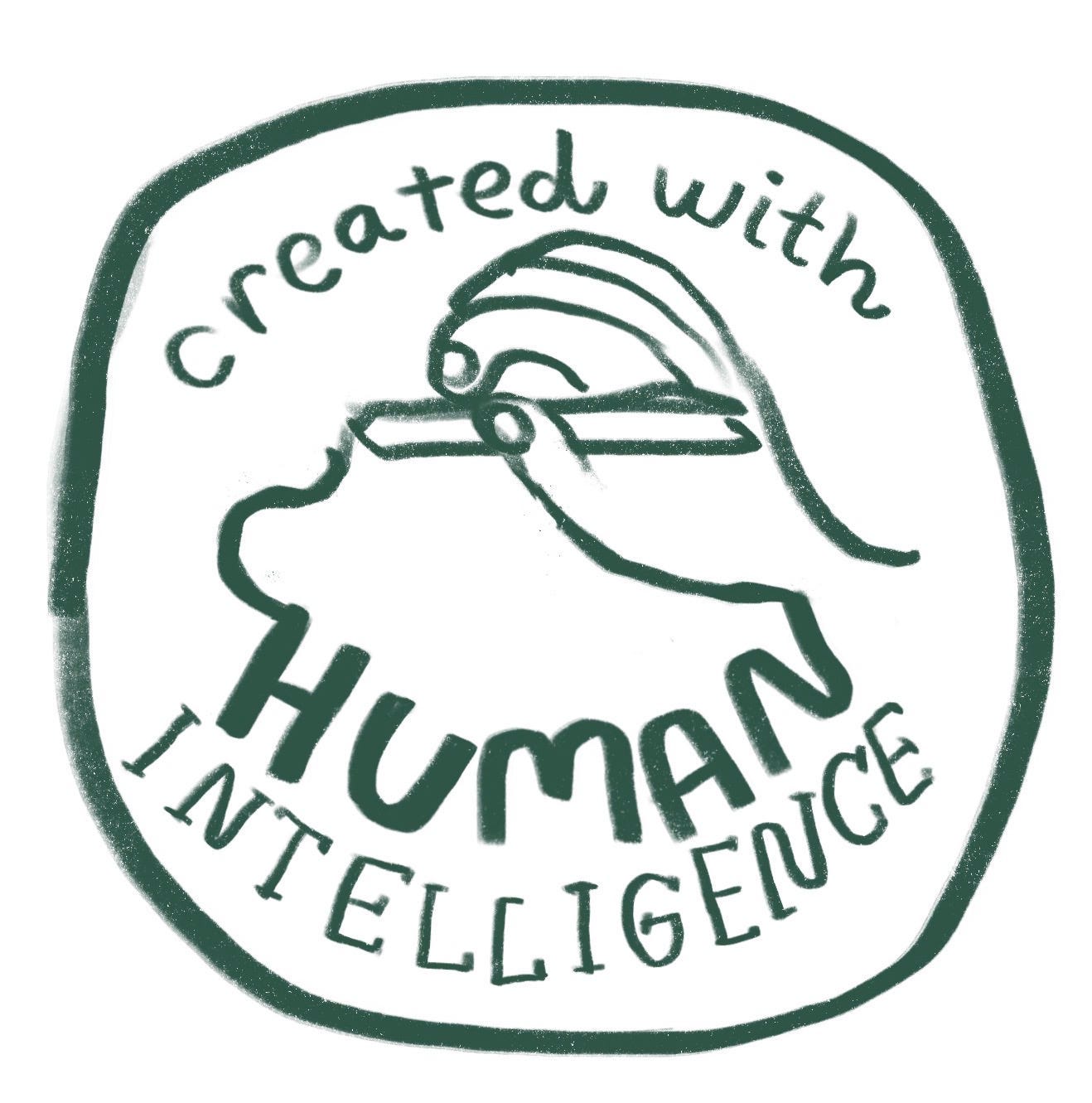
Your study question (#1) about identity stirred something in me. My work with revealing and helping others reveal Blueprint helps identify all the different "players" on our (identity) teams.
And depending on the context of your life, different players need to be on the court while others may need to take a backseat.
Sometimes, you may find that you have one or more players in the game a bit too long and sometimes not enough.
Learning to utilize all your players in harmony with each other at the right time, place, and with the right people is an incredibly valuable and fulfilling endeavor.
It's about adapting to different circumstances while maintaining authenticity and integrity.
We can indeed be ourselves while showing up differently depending on the context of our situation.
What do you think?
-Jenks
You are making me wish I were still reading the Odyssey! The structure of the story really is quite complex—one of the big surprises for me when I read it. Bookmarking your series because I plan on reading it again this winter.